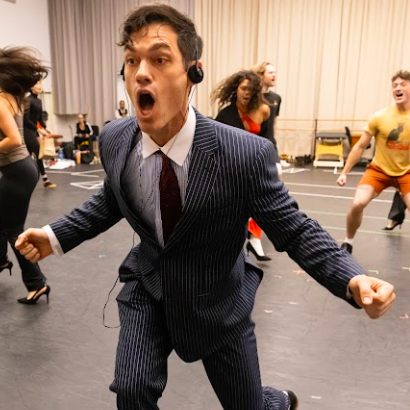
When "American Psycho," the disturbingly hilarious and savagely brilliant novel by Bret Easton Ellis was released in 1991, it sparked a firestorm of controversy due to its over-the-top, blasé depiction of violence. In spite of, or because of, the hysteria, it went on to become a bestseller and has since been hera
lded as a sharp satire of '80s culture.
The story of Patrick Bateman, a slick investment banker and pop music aficionado who may secretly be a serial killer, was turned into a critically acclaimed film starring Christian Bale, Reese Witherspoon and Jared Leto that further solidified its legacy.
And then, somewhere along the way, someone thought, you know what this needs? Songs!
"American Psycho" the musical was born, with music and lyrics by Tony winner Duncan Sheik ("Spring Awakening") and a book by Roberto Aguirre-Sacasa, creator of the hit TV shows "Riverdale" and "Chilling Adventures of Sabrina." The show had a successful London run before premiering on Broadway in 2016, where it ran for just 54 performances. American audiences just weren't ready for a synth-pop, serial killer fever dream.
"It was, frankly, completely depressing personally and a real disappointment," Sheik says. "I think there were a lot of mitigating factors. We were going up against 'Hamilton', which was and is a juggernaut. It just was not the right timing."
In the years since its brief Broadway run, the show has found new life and a dedicated cult following, thanks to productions in Sydney, Chicago and even Japan. It was also staged as a special musical episode of "Riverdale," Aguirre-Sacasa's dark take on the classic Archie Comics characters.
Now, it's getting a whole new life – and some big changes – in Houston. "American Psycho" opens Tuesday as part of Houston Broadway Theatre at the Hobby Center. Aguirre-Sacasa says they've done a "deeper excavation" of the show and brought back some of the texture and nuance from the original London production. The cast includes Broadway and film actor Robert Lenzi as Bateman and Tony nominee Tyce Green ("The Who's Tommy") as Timothy Price.
"Musicals are never done, they just close at some point," Sheik says. "I think part of our job in Houston is, how do we make this thing really tight and really right? I see it as an opportunity."
The Houston production is being directed by Joe Calarco, who reached out on Facebook earlier this year to Aguirre-Sacasa, his friend of more than two decades, about "revisiting" the show. Aguirre-Sacasa discussed it with Sheik, who previously collaborated with the Alley Theatre on "Noir" and "Lover, Beloved: An Evening with Carson McCullers."
After reacquainting himself with the show, Aguirre-Sacasa was struck by inspiration.
"I think literally Joe wanted me to tweak two lines of dialogue. I think that's what he meant by revisiting the piece," Aguirre-Sacasa says. "I said, I think there's some deeper work to be done here. Love it or hate it, this is a work that has endured, and love him or hate him, Patrick Bateman isn't going away. He's sort of like Superman. He keeps getting reinvented and just won't die."
The novel's themes of rampant consumerism, corporate greed and performative politics are deeply embedded in the '80s, as Bateman waxes poetic on skincare routines and pop music. But those overarching themes, and the character's obsession with future President Donald Trump, now feel eerily prescient.
"Somehow, 'American Psycho' predicted the collapse of the American empire and the rise of celebrity culture, and the rise of social media, and the rise of consumer culture, and the collapse of the economy and the disparity of the classes," Aguirre-Sacasa says. "Everything that the book is about, somehow, Brett harnessed, and 45 years later, we're living it."
That sense of aloof moral decay is funneled into the musical through Sheik's electronic score and '80s classics by Huey Lewis and the News, Phil Collins and Tears for Fears. Sheik read the book in college and was fascinated by the contrast between Bateman's love of shiny, happy pop tunes and the darker, more adventurous music that was happening in the New York clubs the characters in the book visited. That push and pull makes for a score that is far removed from your average show tune, a strangeness that is ultimately embraced in every fiber of the show.
"It's a kooky, strange idea, right? We're doing a musical version of 'American Psycho'. No one wants the 'Thoroughly Modern Millie' version of that," Aguirre-Sacasa says. "We're just a little bit more adept at that balancing act."
And in a 2025 full of curated online lives and deepening social divides, the musical's shocking, satirical message feels more relevant than ever.
"I do feel like this moment has provided a context that we didn't have back then," Aguirre-Sacasa. "So we're hopeful and optimistic and meeting the moment differently."
